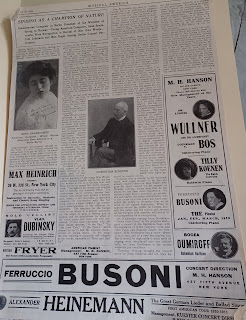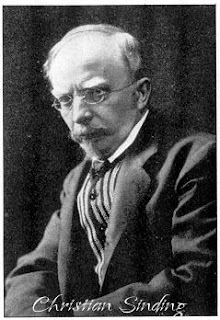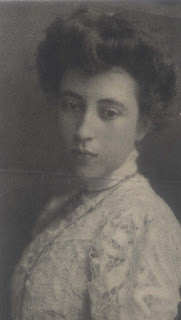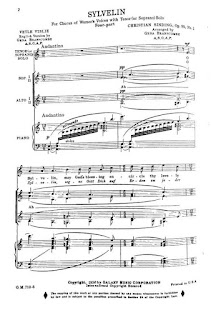“Composing is nothing, but writing letters is tedious
business. When you compose music your
intentions are mostly understood, but when you write you are never sure how
your meaning will be construed.”
(Christian Sinding, composer. Musical
America, March 25, 1910)
In that same March 1910 Musical America article with
Sinding’s quote was a review of a salon concert presented by Gena Branscombe at
the American Women’s Club of Berlin. This
was a well-reviewed concert of her songs performed by Belle Forbes and A.C.
Jackson.
Christian August Sinding (1856-1941) is not well-known in today’s music world. Born in Norway, he eventually studied and lived in Germany coming under the influence of Wagner and Liszt. In his era, he was internationally acclaimed much like his fellow country man Edvard Grieg. His compositions included lyrical piano and chamber music works, symphonies, violin concerti, songs and choral works.
Branscombe and Sinding were residing in Berlin in March
1910. Did they know each other or met
one another in the small music circle of Berlin? Maybe Sinding was in the audience for Gena’s
concert. Both composers would be leaving
Berlin within a few months – Sinding traveling to experience, once again, Norway’s beautiful Spring
and Gena to return to the United States.
Twenty eight years later Gena wrote of Sinding in her November
11, 1938 letter to her publisher, Arthur P. Schmidt Company of Boston:
 “Last Sunday evening, (which was November 6, 1938), on the
Ford Hour, Mme. Flagstad sang my arrangement for solo and chorus of Sinding’s
“Sylvelin” and made a great hit with it.
People who didn’t know it was mine, said they had enjoyed that number –
particularly.” (Arthur P. Schmidt Collection held at the Library of
Congress)
“Last Sunday evening, (which was November 6, 1938), on the
Ford Hour, Mme. Flagstad sang my arrangement for solo and chorus of Sinding’s
“Sylvelin” and made a great hit with it.
People who didn’t know it was mine, said they had enjoyed that number –
particularly.” (Arthur P. Schmidt Collection held at the Library of
Congress)
This Ford Hour performance of her arrangement came as a
surprise to Gena, then, to have Madame Kirsten Flagstad, the great Wagnerian
soprano, perform it was quite the honor. Though not given credit in the program, Gena knew it was her arrangement!
The Ford Sunday Evening Hour was a radio program sponsored by Ford. From 1934-1942 and from 1945-1946 audiences heard the Detroit Symphony Orchestra/Ford Symphony Orchestra perform with guest stars and singers. The show was broadcast live nation-wide on CBS.
How small the music world is. Gena Branscombe knew Edwin McArthur, Madame
Flagstad’s accompanist. Gena understood Sinding’s
musical intention for his song “Sylvelin” and created an arrangement. Maybe Gena showed the piece to McArthur who
then brought the arrangement to Flagstad’s attention who suggested it to the
conductor, Jose Iturbi! All of this is
surmising, yet, Madame Flagstad performed Gena’s arrangement of Sinding’s “Sylvelin”
on the Ford Hour!
With thanks to the Ford Archives for a copy of the November
6, 1938 program.
#BringingBackBranscombe








